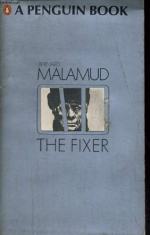|
This section contains 368 words (approx. 1 page at 400 words per page) |

|
The Fixer Summary & Study Guide Description
The Fixer Summary & Study Guide includes comprehensive information and analysis to help you understand the book. This study guide contains the following sections:
This detailed literature summary also contains Bibliography and a Free Quiz on The Fixer by Bernard Malamud.
Bernard Malamud based The Fixer on the case of Mendel Beilis, a Jewish bookkeeper for a brick factory who was accused of ritualistically murdering a Christian child. With very little evidence against him, the Russian government pushed for the conviction of Beilis in order to justify anti-Semitic policies that were being enacted at the time. The novel's protagonist, Yakov Bok, also works in a brick factory, and he is charged, for no particular reason except being Jewish, for a crime just like the one with which Beilis was charged. As in Malamud's fictionalized version, the actual case occurred between 1911 and 1913 in the Ukrainian capital, Kiev. The Beilis case is credited with being one of the main contributing factors in bringing about the Russian Revolution by raising the sense of distrust Russian citizens felt toward their government and the anger of people around the world. The political situation surrounding the case is hardly touched upon in The Fixer. Most of the book focuses on Yakov's life in solitary confinement, waiting for years in prison for the murder charge to be formally levied against him so that he can get on with the trial, The Fixer was published in 1966, more than fifty years after the Beilis case had been settled in court, but Malamud could count on his audience to be familiar with the circumstances of what had happened because the case was and is an important event in the history of the Jewish struggle for peace and security. The book won the National Book Award and the Pulitzer Prize, and is considered one of the finest in the canon of books by one of America's finest authors.
Malamud wrote three more novels in his lifetime: The Tenants (1971), Dubin's Lives (1979), and God's Grace (1982). The Collected Stories of Bernard Malamud, published in 1982, was considered a major event in the publishing world. Malamud died in 1986 in New York City. He is often categorized as a "Jewish writer" because many of the characters and themes in his books concerned Jewish history and especially the Jewish-American immigrant experience. However, he is also recognized as simply one of the best fiction writers of his generation, especially for his craftsmanship of the short story.
Read more from the Study Guide
|
This section contains 368 words (approx. 1 page at 400 words per page) |

|



